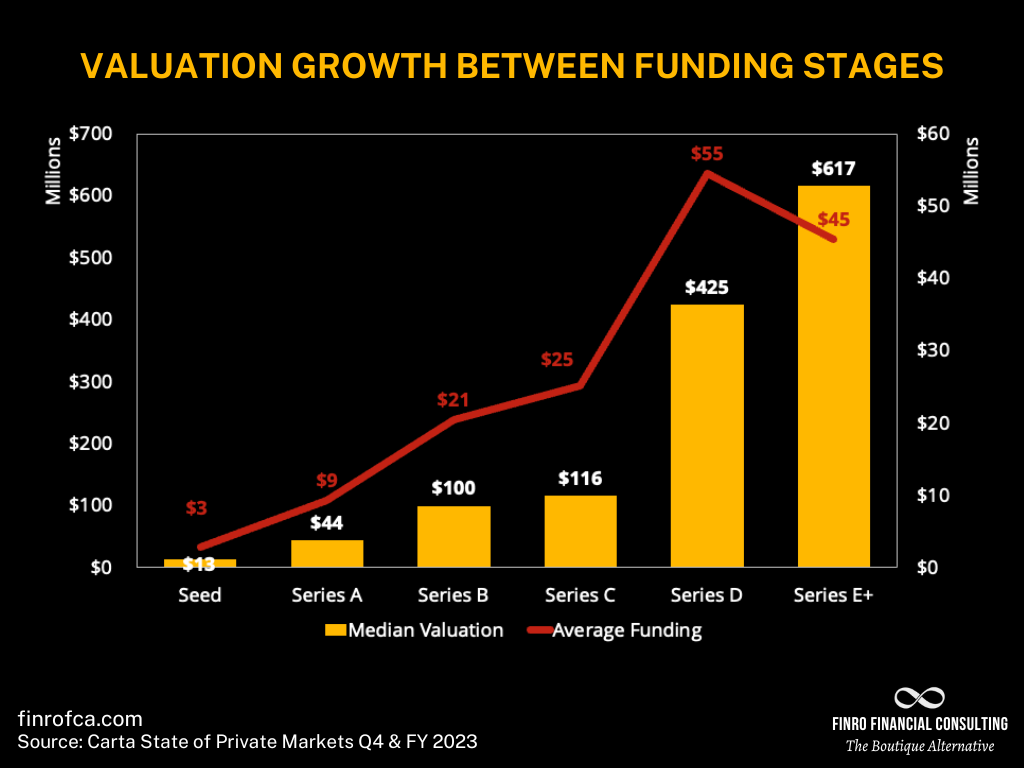How Startup Milestones Boost Valuations?
By Lior Ronen | Founder, Finro Financial Consulting
For a startup, the journey from a fledgling idea to a thriving business is paved with numerous challenges and achievements. Central to this journey are milestones – specific goals that serve as markers of progress and success. But these milestones are more than just checkpoints; they play a crucial role in determining a startup's valuation.
For startup founders and tech investors alike, understanding the interplay between startup milestones and valuation is crucial. This article breaks down how reaching key milestones can significantly impact a startup's worth in the eyes of investors and the market. From securing the first round of funding to achieving profitability, each milestone achieved has the potential to elevate a startup's financial standing and market position.
As we explore this topic, we'll uncover why milestones matter, how they influence valuation, and what startups can do to leverage these critical moments effectively.
Startup success and valuation are deeply influenced by the achievement of key milestones across various stages, including developing a prototype, securing funding, user base growth, and market expansion. Each milestone achieved reduces risk and enhances valuation by demonstrating progress, market potential, and business viability. For founders and investors, understanding these milestones is crucial for strategic decision-making and maximizing a startup's market value.
Understanding Startup Stages
In the exhilarating and often unpredictable journey of a startup, each phase of development presents unique challenges and opportunities.
It's crucial for founders and investors to recognize and understand these distinct stages, as they form the backbone of a startup's evolution from a mere concept to a fully-fledged enterprise.
These stages – from the initial ideation to the growth and maturity phase – are not just a sequence of steps; they are pivotal periods that define the strategic direction, operational focus, and funding requirements of the business.
Grasping the nuances of each stage is essential for effectively navigating the startup ecosystem, as it allows for better planning, smarter decision-making, and more accurate valuation of the business at different points in its lifecycle.
This understanding is particularly vital when assessing how successfully reaching specific milestones can influence a startup's valuation and appeal to investors.
There are general five stages in a startup’s life:
1. Idea Stage: The Idea or Concept Stage is where it all begins. It's the phase where founders turn their ideas into potential business concepts. This stage involves brainstorming, preliminary market research, and the initial formulation of the business plan.
A blend of excitement and uncertainty characterizes this stage; this stage is about creativity and ideation. Founders are typically engaged in validating the feasibility of their ideas, exploring potential markets, and sketching out the broad strokes of their business models.
The Idea stage offers the unique opportunity to innovate and craft a distinctive value proposition.
Founders can pivot and refine their ideas based on initial research and feedback, setting the foundation for a successful business. The main challenges here include defining a viable and scalable business model, gaining initial support and feedback, and overcoming the ambiguity and risk inherent in untested ideas.
2. Seed Stage: This stage marks the first steps in bringing the startup idea to life. The seed stage is when the startup begins to materialize, often with the development of a prototype or Minimum Viable Product (MVP) and securing initial funding, typically from friends, family, or angel investors.
The seed stage sees the formation of the core team and the development of a prototype or MVP. The focus is on validating the business concept in a real-world setting and beginning to build a customer base.
Key challenges here include proving the business concept to early adopters and investors, securing initial customers, and managing limited resources and funding. The Seed Stage presents opportunities for significant growth if the concept is validated successfully. It's a chance to test the market, gather valuable user feedback, and refine the product or service.
An MVP, or Minimum Viable Product, is a fundamental concept in the startup world, referring to the most basic version of a product that can be released to the market. The primary purpose of an MVP is to test and validate the core business hypotheses with minimal resources.
It includes only the essential features that solve a core problem for a target audience, allowing startups to gather user feedback and learn about customer preferences and behaviors early in the product development cycle. By focusing on the MVP, startups can avoid spending time and resources on developing features that customers do not need or want, thereby reducing risk and increasing the efficiency of the product development process.
The MVP is a strategic tool to quickly enter the market, learn from real-world use, and iteratively improve the product based on actual customer feedback.
Read more
Get your expert valuation now!
3. Early Stage: During the early stage, the startup focuses on refining its product, achieving product-market fit, and gaining traction in the market. This phase often involves seeking seed or early-stage venture capital funding to scale operations.
Startups at this stage typically refine their products or services based on user feedback, focus on building a solid customer base, and start to generate consistent revenue streams.
Here, the startup faces challenges in achieving consistent revenue, expanding the user base, refining the business model, and attracting more substantial funding. However, it offers the opportunity to scale the business, strengthen the market position, and attract more substantial investment, laying the groundwork for future growth and success.
4. Growth Stage: The growth stage is characterized by rapid expansion. The startup's product or service is well-established in the market, and the focus shifts to scaling the business, increasing market share, and possibly exploring new markets.
Startups in this phase experience rapid growth in customer base and revenue. The challenges include managing this growth, scaling operations efficiently, maintaining company culture, and ensuring the quality of products or services.
The main challenges here are managing rapid growth, scaling operations efficiently, maintaining quality and company culture, and dealing with increased competition are the primary challenges.
This stage offers significant revenue growth, the potential for market dominance, and opportunities for preparing for IPOs or acquisitions.
An acquisition is when one company buys another, gaining control over its operations and assets. It can be friendly or hostile, and aims to expand market share, diversify products, or acquire new technologies. Acquisitions reshape industries, influencing market dynamics and company growth.
Read more
5. Maturity Stage: In this stage, the company enjoys a significant customer base, stable revenue streams, and possibly expansion into new markets or product lines.
The company at this stage has an established market presence, with challenges revolving around sustaining innovation, exploring new markets, and managing a larger organizational structure.
The main challenges include fending off competition, managing a larger organization, and sustaining innovation and relevance in the market. On the other side, ample opportunities exist for diversification, solidifying the company's market position, and ensuring long-term stability and growth.
| Stage | Description | Characteristics | Challenges | Opportunities |
|---|---|---|---|---|
| Idea Stage | The initial phase where the business idea is formed and refined. | High excitement, uncertainty, ideation, market research. | Defining a viable business model, securing initial support. | Opportunity to innovate and create a unique value proposition. |
| Seed Stage | Early development of the business with initial funding, often for creating a prototype or MVP. | Building a core team, developing a prototype, initial user feedback. | Proving the business concept, securing initial customers, managing limited resources. | Potential for significant growth with successful concept validation. |
| Early Stage | Focus on product development, market fit, and user acquisition. | Refinement of product/service, market fit analysis, building customer base. | Achieving consistent revenue, expanding user base, refining business model. | Scaling the business, attracting more substantial funding. |
| Growth Stage | Rapid expansion, with an established product/service in the market. | Scaling operations, expanding market share, company culture management. | Managing rapid growth, scaling operations efficiently, maintaining quality and culture. | Significant revenue growth, potential for market dominance, preparing for IPO/acquisition. |
| Maturity Stage | Established market presence with stable revenue streams, possibly expanding into new markets. | Sustained innovation, market expansion, large-scale operations. | Fending off competition, managing a larger organization, sustaining innovation. | Opportunity for diversification, solidifying market position, long-term stability. |
The Role of Milestones
In the context of startups, milestones are significant achievements that mark key stages of progress in the company's journey. These are specific, measurable goals that serve as indicators of a startup's development and potential for success.
Milestones are crucial for both internal assessment and for communicating value and progress to investors and stakeholders. They offer tangible proof of a startup's evolution, validating the business model and strategy.
Setting and achieving these milestones is a critical part of a startup's growth narrative and is often linked to the company's ability to secure funding and increase its valuation.
Examples of Key Milestones:
Prototype Development and MVP Launch: Creating a working prototype or a minimum viable product is a fundamental milestone, as it moves the startup from concept to a tangible product.
Securing Initial Funding or Seed Capital: Obtaining initial funding, whether from angel investors, venture capitalists, or crowdfunding, is a significant milestone that validates the business concept and supports further development.
First Customer or User Base Growth: Acquiring the first customers or reaching significant numbers in the user base demonstrates market demand and the startup's ability to attract and retain customers.
Revenue Milestones: Generating the first revenues or reaching specific revenue targets is crucial, as it indicates the startup's potential for profitability and scalability.
Strategic Partnerships and Alliances: Forming partnerships with established companies can be a milestone, indicating market recognition and enhancing business credibility.
Product Launch: Launching the final product into the market is a major milestone, marking the transition from development to sales and market presence.
Expansion into New Markets: Successfully entering new geographical or product markets signifies growth and the scalability of the business model.
Achieving Profitability: Reaching a point where revenues exceed expenses is a critical milestone, indicating financial sustainability.
Follow-on Funding Rounds: Raising additional funding in subsequent rounds, especially at higher valuations, reflects investor confidence and the startup's growth trajectory.
Exit Events: Achieving a successful exit, whether through an acquisition or an initial public offering (IPO), is often the ultimate milestone, realizing the value of the startup for founders and investors.
Each of these milestones plays a pivotal role in shaping a startup's path. Achieving them not only demonstrates progress but also significantly impacts how investors and the market perceive the startup's value and future potential.
Milestones and Valuation
In the startup ecosystem, reaching key milestones is not just a measure of progress; it significantly influences a startup's valuation.
Valuation, at its core, is an estimation of a company's worth, often seen through the lens of future potential and current achievements. Each milestone achieved - be it developing a working prototype, securing initial funding, or expanding into new markets - serves as tangible evidence of a startup's growth potential and reduces the investment risk.
This risk reduction is key; as a startup progresses and de-risks its business model through achieving milestones, its valuation typically increases. Investors see these milestones as checkpoints that validate the startup's business model, market fit, and growth trajectory.
For instance, reaching a revenue milestone or achieving profitability demonstrates not only market demand but also the potential for sustainable growth and future profitability, which are crucial factors in driving up valuation.
From an investor's viewpoint, milestones are critical indicators of a startup’s potential and risk. They look for these markers to gauge whether a startup is on the right path and to assess the feasibility of its long-term vision. Investors are particularly interested in how well a startup navigates from one stage to the next, how efficiently it utilizes resources, and how it responds to market feedback.
Achieving key milestones, especially those related to product development, market penetration, and financial stability, signals to investors that the startup is evolving as planned and is a viable candidate for further investment. Investors often base funding decisions and valuation estimates on the startup's ability to meet or exceed these milestones.
They offer a form of validation and de-risking that is essential in the high-stakes, high-risk world of startup investing. For startups, understanding this perspective is crucial. Articulating and demonstrating clear milestone achievements can be a powerful tool in negotiations and in attracting further investment.
In this section, we see that milestones are more than just goals; they are pivotal markers that significantly influence how a startup is valued and perceived in the market. For founders and investors alike, understanding this link is key to navigating the startup landscape effectively.
This impact of milestones on valuation is clearly creates an upward trend in both median valuation and average funding amounts as startups progress from Seed to Series E+ stages. This indicates that as companies mature and pass through each funding round, their value and the confidence investors have in them increases, leading to larger funding amounts.
Conclusion
As we've explored in this article, the journey of a startup is marked by a series of significant milestones, each playing a vital role in shaping the company's future. From the initial ideation to the growth and expansion stages, these milestones are not just markers of progress but are instrumental in influencing a startup's valuation. They serve as tangible indicators of a startup's potential, maturity, and ability to navigate the complex business landscape.
For startup founders, understanding the importance of these milestones, and more crucially, how to strategically leverage them, is essential. It's about striking a balance between ambitious goal-setting and realistic, measurable achievements.
For investors, these milestones offer a lens through which to assess a startup's growth potential, risk factors, and long-term viability.
In the end, the story of a startup is told through the milestones it achieves. Each milestone, whether it’s securing funding, launching a product, or expanding into new markets, writes a chapter of success and learning. This narrative not only shapes the company’s valuation but also its identity in the competitive world of business.
As we move forward, both founders and investors should continue to focus on these critical points of progress. After all, the journey of a startup is as much about the milestones reached as it is about the vision, persistence, and agility with which these milestones are pursued.
































